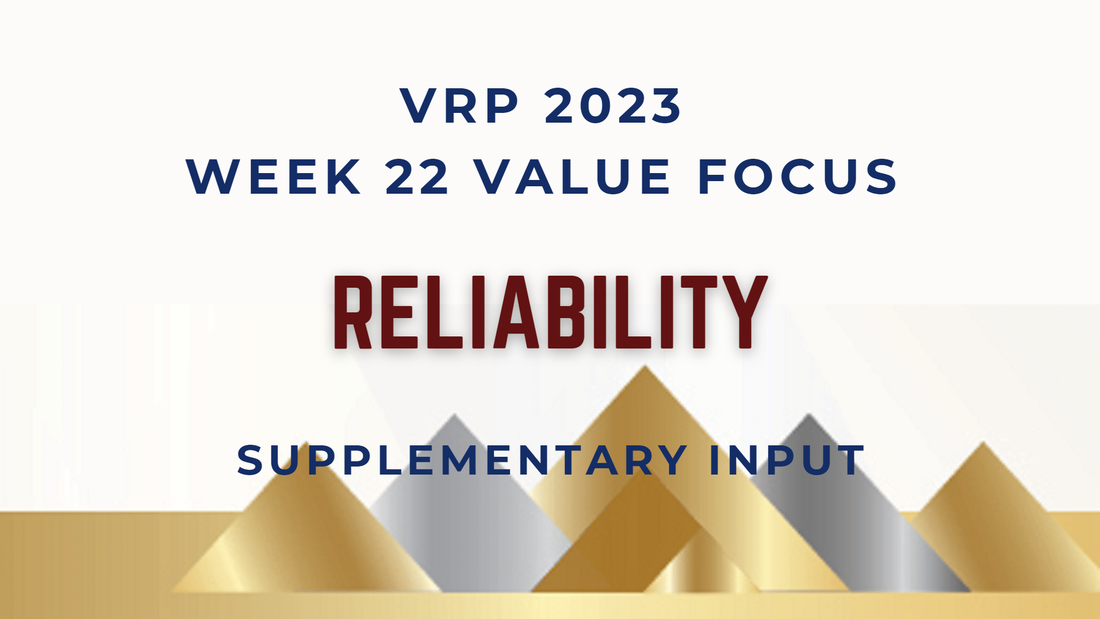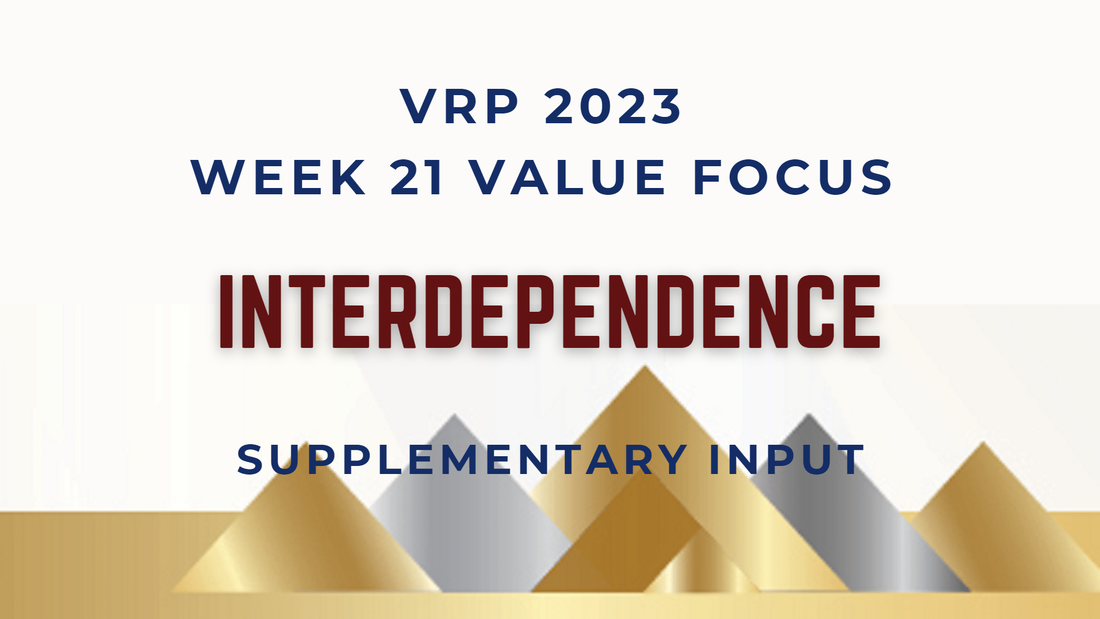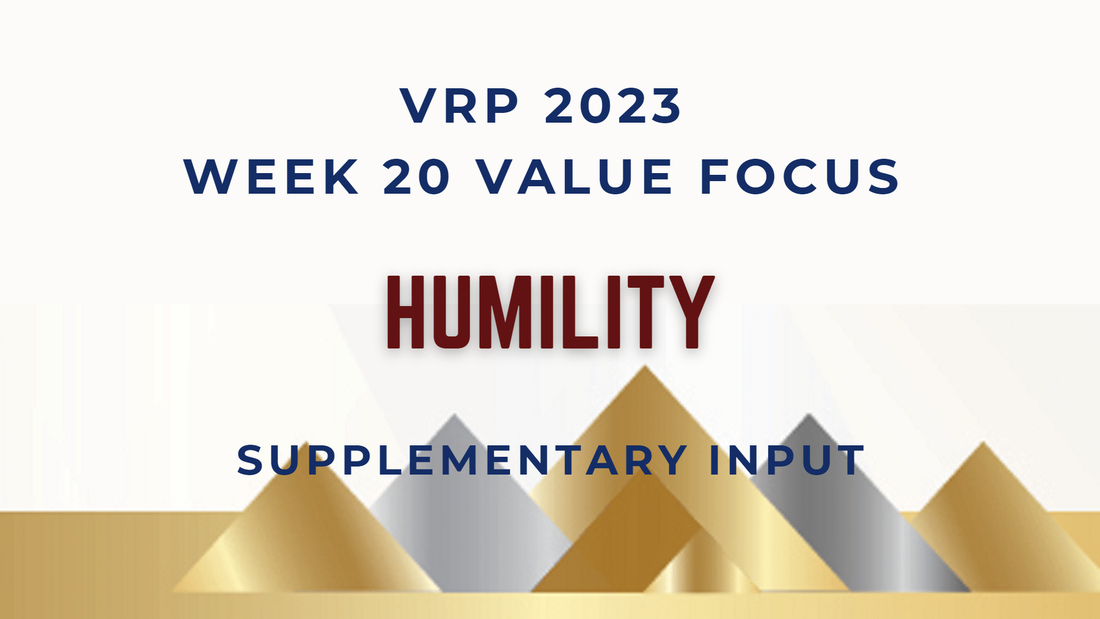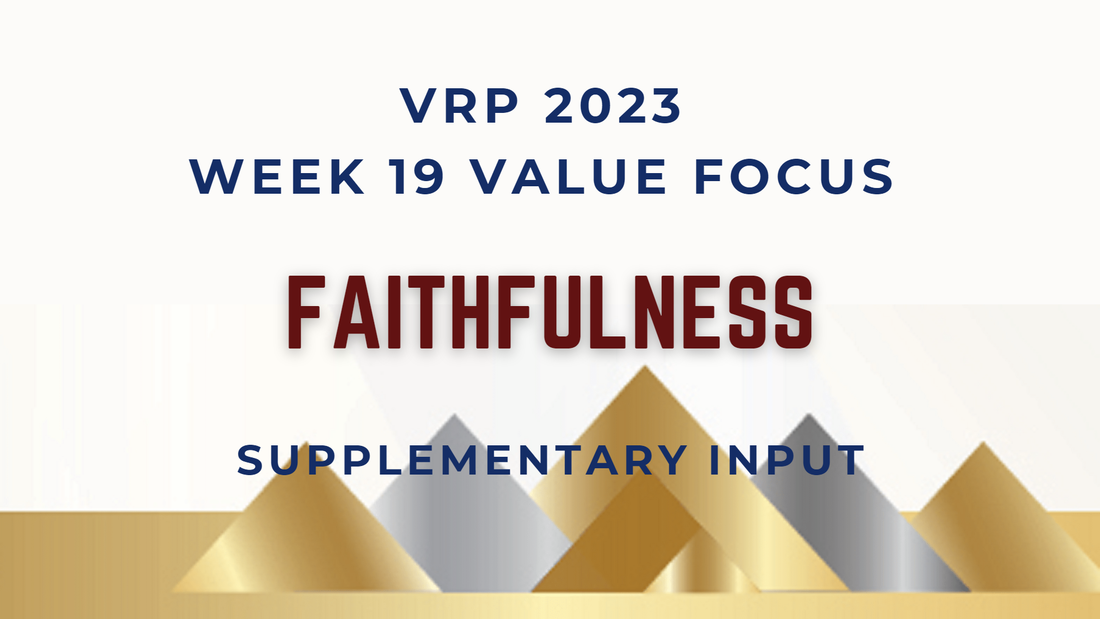|
By JESUS V. SISON, PTRP CRFV Deputy National Director "Do actions agree with words? There's your measure of reliability. Never confine yourself to the words." ~ Frank Herbert
A person’s reliability is one of the most esteemed traits in him/ her. It allows an individual to possess the capacity to handle simple or complicated challenging situations in providing timely solutions and execute accurate plans. It is a character of choice individuals endued with uncompromising values that we can count on amid perplexing times. It causes a person to be cherished as he/she projects that both his/her words and actions are reliable and that lives are protected. Put simply, being reliable means what we say is consistent in what we do. It emphasizes that those who can be trusted to follow through in the little things are the people to be trusted with the bigger things. Above all, reliability reminds us that the unswerving things in this world that we truly can depend on and aid us are the love of God and the word of the Lord. It has been God and will always be the One Whom we can rely on for He is perfectly consistent. And since we were all created in His image and likeness, we should also be the same. To be reliable, we must know exactly what is expected of us, whether the expectation is from ourselves or others or both. Expectations prepare us for the setting of targets and goals. Then be intentional to hit these goals and reach the objectives. Intention cuts through to any excuse. Observing archers, before they step on the archery range, they already know what their expectations and their coaches’ expectations is. Thus, they have a steady aim towards a specific target and not just randomly shoot arrows. Setting their targets lets them prepare sights and arrows to strike it accurately. As we understand the concept of archers improving their precision, it should be exciting to appreciate that the same concept applies to setting specific intentions for us to become reliable. The moment we define and commit ourselves to hitting a single bulls-eye, the paradigm shift towards success commences. You will now know that reliability is at work if we can control our thoughts, behaviors, moods and habits. We are not dominated by our whims but what we planned and said will be completely done. What we expect and honestly think, we carefully plan, truthfully declare and committedly do. Again, people who are reliable possess unwavering commitment. They do not fail others who depend on them. They would go through the fire of encounters without leaving you in the heat of the battle. They are willing to make selfless sacrifices as they go down and serve others disregarding their own titles, status or even reputation. In addition, reliable men and women are indefatigably consistent in excellence regardless of varying demands from the same people they help. First and foremost, they excel in service because their mindset is not only to work for God, but they allow God to work through them. Second, they are commendably consistent because God’s skill directs them, and His might empowers their inmost being to complete every task anytime and anywhere. In the stillness and confidence on God, they find their strength. They are indeed dependable because they depend on God. Moreover, individuals who are reliable retain unquestionable faithfulness. They are faithful to God, their family, agency and fellow people. They are steadfast on what they believe they ought to do according to the will of God and the One who appointed them. They have an unalienable possession in the love of God, family, country and fellowmen. Their devotion to the people and service were woven in the fabric of their very being which can never be obliterated or extracted. Thus, everyone is reminded of the faithful God whose goodness is incomparable and His loving-kindness is always available. Therefore, let our actions agree with our words and intentions. This will truly measure our reliability.
0 Comments
by: Ms. Carol Lim The need for each other is not a weakness. It is called interdependence. It is both a fact and a truth that we need each other, as the Word says, “None of us lives for himself and none of us dies for himself”. In fact, even in the most basic unit of society - the family, interdependence is very visible. Children need the love and care of their parents while the parents draws inspiration and motivation from their children to take the extra mile in providing and caring for them.
In our society, each one has gifts, skills, and talents that one can share to others and contribute to the overall wellness of the community. For instance, some are good in the sciences where doctors, engineers and scientists arise from; in the arts where singers, dancers, and artists emanate; in sports where different kinds of players and athletes excel from; and in other fields where we can see people with different skills who are able to contribute to the society. Although we have different gifts, skills, and talents, this does not mean that we are independent from each other. These are given so that we can be one whole body and be as one in meeting the different demands in our community and society. Since no one but God is omniscient or all-knowing, we need the expertise of one another in order to address a need. This way, we are knit together as one community that will progress and prosper as one country, just like what the Holy Scriptures says, “…As each part does its own special work, it helps the other parts grow, so that the whole body is healthy and growing and full of love.” Just like our bodies, we cannot just separate nor isolate one part from the other in a perfectly functioning body. We cannot separate the cardiovascular system from the body because if we do, no oxygen, nutrients, nor important substances can be supplied to other parts and organs. Nor can we separate the skeletal system because if we do, the body cannot stand because it lacks support and protection. Parallel to our society as one body, each one’s contribution is significant. We cannot afford to be part of the body that will bring forth its destruction or malfunctioning because others that are mutually dependent on us will also be affected. Our actions may bring either negative or positive effect to the bigger community we belong to. Say for example, the effect of the conflict between Russia and Ukraine. This has created a negative impact on many countries, ours included. Interdependence includes accountability. We must be circumspect in our actions so that we will not be the cause of others’ loss or suffering. As we are but in one nation, one world, one Earth, let it be that our contributions to our society be positive and significant. Let our interdependence bring forth peace, progress, and prosperity so that we could reach Ambisyon Natin even before 2040. by: Ame-Phil O. Saquiban Growing in humility has power. First, it gives us the power to reach out to others. It helps us connect genuinely and identify ourselves with others. It finds ways to effectively bring the message to people concerned. This power to reach out was demonstrated by our Lord Jesus Christ that while He knows that He is the Son of God, He came in the likeness of man and took the form of a servant so that He could reach us out and bring us to where He is, to a level of holiness and righteousness.
Another is the power to spur reconciliation. Without humility, conflicting people cannot be restored back to their original relationship. They will never come in between and make amends with one another. But with humility, there is reconciliation that will eventually result to unity at home, in the community or in the workplace. Without humility, we tend to look down on others and consider ourselves better all the time. If we are leaders with such attitude, we cannot muzzle a group of people to believe in us and support us. Soon people will leave us because we tend to abuse our power and become harsh to them. But what was written for us regarding this? We must consider others better than ourselves. It is recognizing the grace working in the life of others and admitting that there are things that we cannot do that others can and that we need one another. Third thing that humility can empower us with is to bring restoration to an erring person. A person who is not humble finds it difficult to recognize and admit the mistakes committed. In so doing, this person will never be restored into his or her original state before he/she committed sin. Let us consider again the life of the prodigal son in the Scriptures. If he did not humble himself and went back to his father, he could not have been restored to his original position as a son. But the moment he humbled himself before his father, everything was restored to him. His rights, authority, and privileges as a son were restored back to him. Perhaps, in our case, our Almighty Father is just waiting for us to humble ourselves and confess our sins before Him so that we can be restored back to where we have been. Also, let us remember that we need the aid of the Almighty God as Filipinos. God also made clear His condition for the healing of our land – “if My people will humble themselves and pray and turn from their wicked ways, I will hear from heaven and heal their land”. by: Dr. Laurence A. Mascay In the book of Luke, a parable is told by Jesus about a king who gave ten of his servants a bag of money each before traveling to a country far away. The king commanded them, “Do business with this money until I come back.” The story is about God entrusting His resources to His stewards for them to be faithful. In this parable, faithfulness is not doing the same thing over and over again, rather, faithfulness is reflected as being very productive. When the king came back, the first servant who gave an account was found to be faithful or very productive by earning ten bags of money with the one bag of money he received and invested. As a result, the king said to him, “Well done! You are a good servant. You have been faithful with the little I entrusted to you, so you will be governor of ten cities as your reward.”
To be faithful or productive in our day-to-day affairs is to know why we do what we do or as the popular TV commercial says, “Para kanino ka bumabangon?” That is to know God and His Son Jesus Christ and to glorify Him through the things that we do. Consequently, when we know the purpose of why we wake up each day, our lives becomes exciting and productive - not a mere monotonous cyclic routine. Tim Challies, a noted speaker, says, “Productivity is effectively stewarding your gifts, talents, time, energy, and enthusiasm for the good of others and the glory of God.” Each one of us has been entrusted by God with a lot of things - life, health, family, work, money, business, etc., wherein we are expected to be faithful. Such faithfulness has to be shown in the quantity and quality of outcomes or results of our labors, for one, as we fulfill our duties and responsibilities as civil servants. Moreover, promotions, incentives, or accolades are natural results of the faithfulness of good stewards and they come in God’s favor. Asaph, an author of the book of Psalm, says, “Promotion comes neither from the east, nor from the west, nor from the south. God is the judge. He decides who will be important; he lifts one person up and brings another down.” Let us continue to give our best shots and seek to be faithful or very productive in what is entrusted to us like the good and faithful servant in the story of Jesus. Because when we are faithful to little things, we will be entrusted with greater things. To be faithful then is to be fruitful. |
CRFV Winning TeamA company of men and women who have committed their lives to the cause of national transformation. Archives
July 2024
Categories
All
|
Our Services |
Our Organization |
SupportSupport Page
FAQ Terms of Use |
Copyright © 2015 | Baguio City, Philippines 2000 | 074-424-1497 | [email protected]





 RSS Feed
RSS Feed
